“We don’t have enough testing!” This appeal by government officials and public health advisors echoed in virtually every Zoom conference call and family bubble dinner tables. March 2020, the beginning for most of us, started the demand for bringing testing on-demand. Countries like South Korea had led the charge on a per-capita basis early in the pandemic with 3,692 tests per million of people versus five tests per million in the United States. Today, COVID-19 testing is readily available, not, for the most part, from government entities, but private healthcare providers (and non-healthcare providers).
At the peak of Omicron, every unused parking lot, urgent care, and corner pharmacy offers some version of rapid or PCR test. At $100 plus reimbursement, the business was (and probably still is) very profitable for those able to obtain volume. The low start-up costs and high demand made this a very attractive pop-up business for many, including those without any healthcare experience. The ultimate result will be a wave of enforcement against what regulators will consider low-hanging fruit in assessing recoupments, fines, and yes, even criminal charges. These actions will not just be against bad actors, though their are plenty, it will be against those that are newcomers to the wonderful, sometimes irrational, world of healthcare compliance.
Common Pitfalls in the COVID-19 Testing Business
Though there are some new laws under the CARES Act and certain regulatory waivers during the Public Health Emergency, the regulatory framework surrounding the COVID-19 testing business is pretty well-known and tested. Despite this, these are some common traps that operators find themselves in:
- Corporate Practice of Medicine. Illegal financial arrangements between physicians and non-physicians, and labs.
- Coding. Adding extra CPT codes inappropriately in order to increase reimbursement
- Staffing. Testing is performed by unqualified personnel
Each of these pitfalls have a range of consequences. Though in the early days of COVID-19, there is likely some tolerance from regulators for non-compliance, but by 2021, commercial payors were already auditing and recouping for claims related to testing performed in mid-2020.
Practice of Medicine and the COVID-19 Testing Business
The definition of the “practice of medicine” varies slightly by state, but in general the practice includes the diagnosis or treatment of a disease. What does this mean for testing for the coronavirus? In general, performing laboratory-developed tests are not the practice of medicine, but determining the medical necessity to obtain the test, interpreting such results, and possibly the collection of specimens in connection with such tests may be considered the practice of medicine.
In general, diagnostic tests, even the most basic blood test need an ordering physician for it to be considered medically necessary and reimbursable under public and private payors; however, COVID-19 testing is a little unusual because CMS rules allows testing (with some restrictions) to be performed without a physician order. Practically, however, labs and healthcare facilities will not perform testing and payors will not reimburse without a physician order.
Physician and Non-Physician Financial Arrangements in COVID-19 Testing
Given that most states prohibit the corporate practice of medicine and the practical need for physician involvement in COVID-19 testing, many testing businesses involve the partnership financial arrangement between a licensed healthcare provider and unlicensed individuals and entities. Within the marketplace, you will see all sorts of “clever” ways that medical entrepreneurs try to circumvent rules surrounding the prohibition of the corporate practice of medicine, anti-kickback law, and splitting fee prohibitions.
The line between payment for a referral versus payment for some other bona fide service is very thin and often misplaced by both attorneys and legal laymen. There are subtleties in this area that any generalized statement or rule of thumb can be very misleading–so consider this when doing your own research and reading this: any payment that is paid by a healthcare provider to a non-healthcare provider should be (i) disconnected from any referrals, (ii) in exchange for a legitimate, bona fide product or service (that is actually provided or performed), and (iii) at a rate that is at least commercially reasonable, if not at fair market value.
WARNING: Even if you feel you have satisfied these elements on paper, the application and specific context of your financial arrangements still may not be compliant–seek legal counsel on how to mitigate risk. “Mitigation” is likely the right word as you are unlikely to “eliminate” risk in these kinds of relationships.
Financial Relationships with Labs
Lab kickback schemes have received more recent attention by the Department of Justice by parties taking advantage of certain regulatory waivers associated with the Public Health Emergency. Lab services are considered a designated health service which is applicable to Stark law. Since most states’ anti-kickback laws mirror Stark, state law poses additional risk to any kind of financial arrangement between a referring or ordering physician and a lab. Unlike the financial relationships between non-physician and physicians, the relationship between a physician and a designated health service provider, like a laboratory, has a lower level of tolerance for noncompliance. If you are considering some kind of arrangement that directly or indirectly encourages a physician to refer COVID-19 tests over to a lab, consider that it is more than likely any remuneration that is in connection with that arrangement is an illegal kickback.
Which Codes to Use (and not use) in a COVID-19 Testing Business
Coding is an area of law that actually does change quite often and has especially in the COVID-19 testing business. There are about a dozen CPT codes and about the same amount of ICD 10 codes that did not exist pre-2020 that now are common place. Many of those codes did not exist prior to 2021. With any moving target in regulatory compliance, you will see all sorts of bad practices, some on the border of compliance and others way past what would be considered outright fraudulent billing in this area.
If you are in the business, you have more than likely have at least seen this purple branded PDF from the AMA, updated every few months as guidelines change:
Though very helpful, you will find layman who reference this PDF with inaccurate conclusions. This is the effect of seeing what you want to see in order to justify the codes you want to bill.
When assessing appropriate coding, the test of validity and compliance is not whether the payor will pay. In fact, most compliance issues in billing are discovered after a payor recoups on a claim that was paid, not in a denial. There are many ways to bill certain codes listed in the PDF above legitimately, but often actual implementation is impractical or even not profitable.
A big change that affected not only the COVID-19 testing business, but primary health, in general, was the coding guidance changes effective January 1, 2020, which permitted E/M levels to be determined on the level of medical decision making and not on time spent with a healthcare provider. Later in that year, CMS made issued some COVID-19 specific guidance that also gave some clarity on using some of these non-laboratory related CPT codes.
In order to ensure compliance in coding, every provider should get at least one outside coding audit per year. If you are a facility, just starting out, or a provider with above-average volume, consider a quarterly external audit and a monthly internal audit. This can be extremely useful from a revenue cycle management perspective as well.
Who is Permitted to Obtain COVID-19 Specimens?
Nasopharyngeal testing generally can be administered by a medical assistant (and above) level of training and licensing (most states do not license or certify medical assistants). This is the position of the American Association of Medical Assistants. They base this finding on the same guidance released by CMS in March 2020. This, however, is not the opinion of the Medical Board of California and some other states. Despite the public health emergency, the medical board has not revised its previously published position regarding the ability for non-licensed persons from performing nasopharyngeal swabs and maintain that a nasal swab only would be permitted. Leave it to health experts to describe the difference between the two.
Pop-up or Tear Down?
Though it is unclear whether popup testing will grow again in the next surge, we at least know that uninsured patients no longer have affordable access to testing due to the funds that supported reimbursement from HRSA has run out. COVID-19 testing needs may decrease, but it will not go away anytime soon.
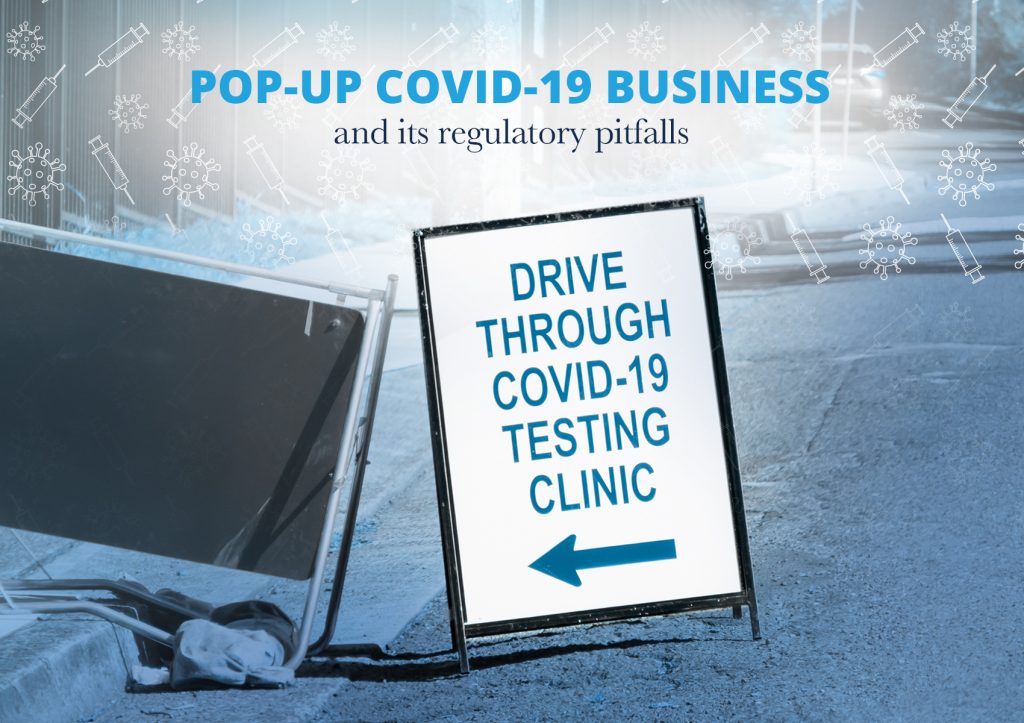
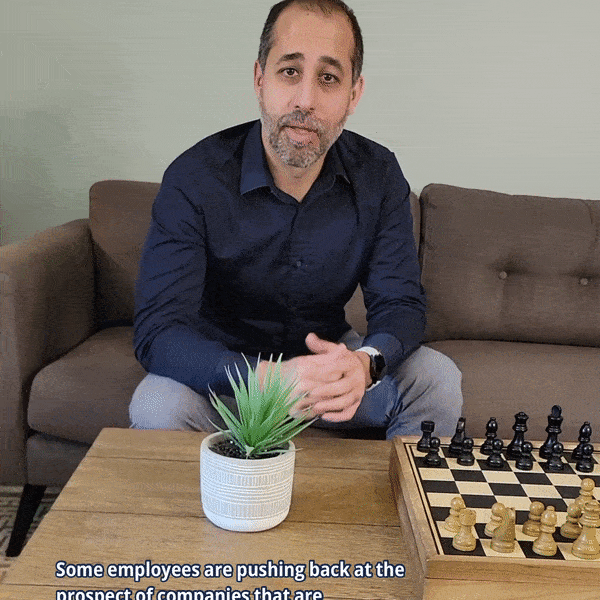
![Vaccine Mandates Supreme Court Rulings [E317]](https://www.pashalaw.com/wp-content/uploads/2022/02/WhatsApp-Image-2022-02-11-at-4.10.32-PM-1024x723.jpeg)

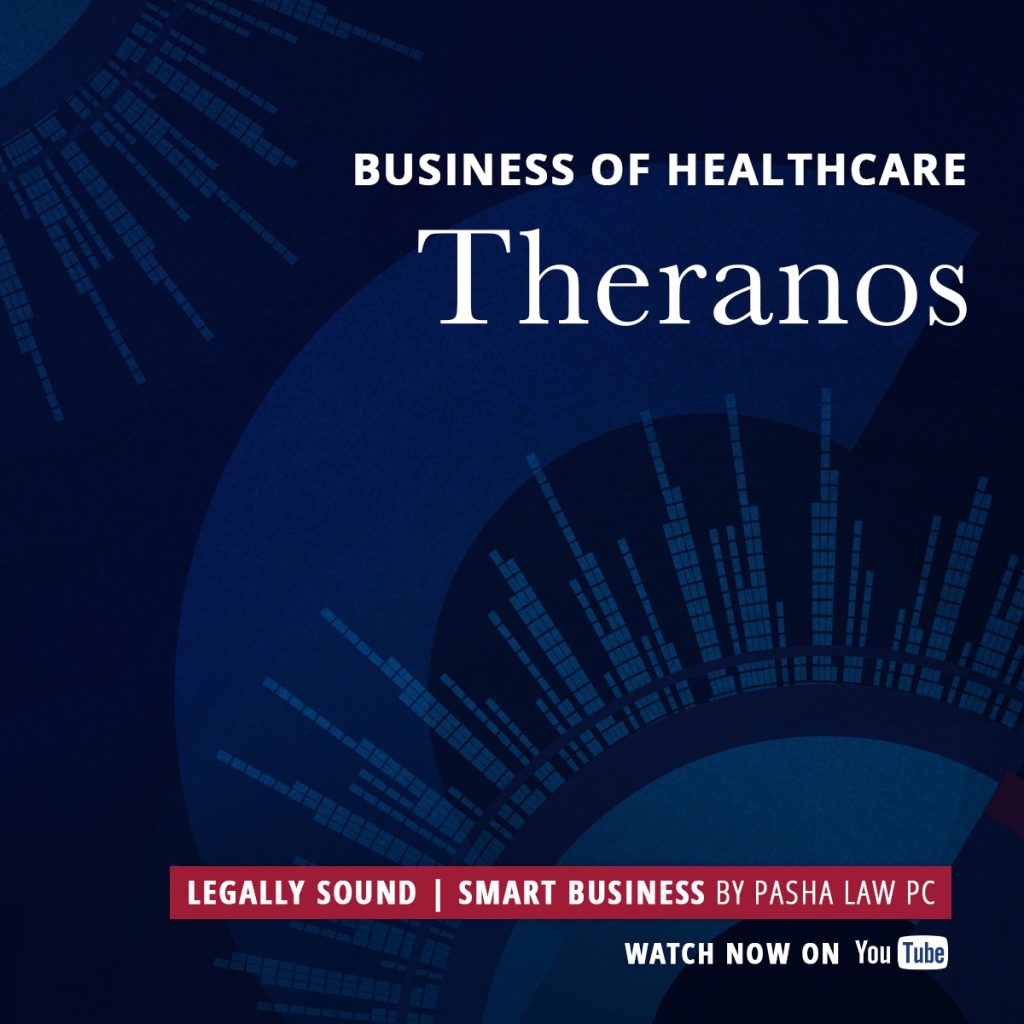
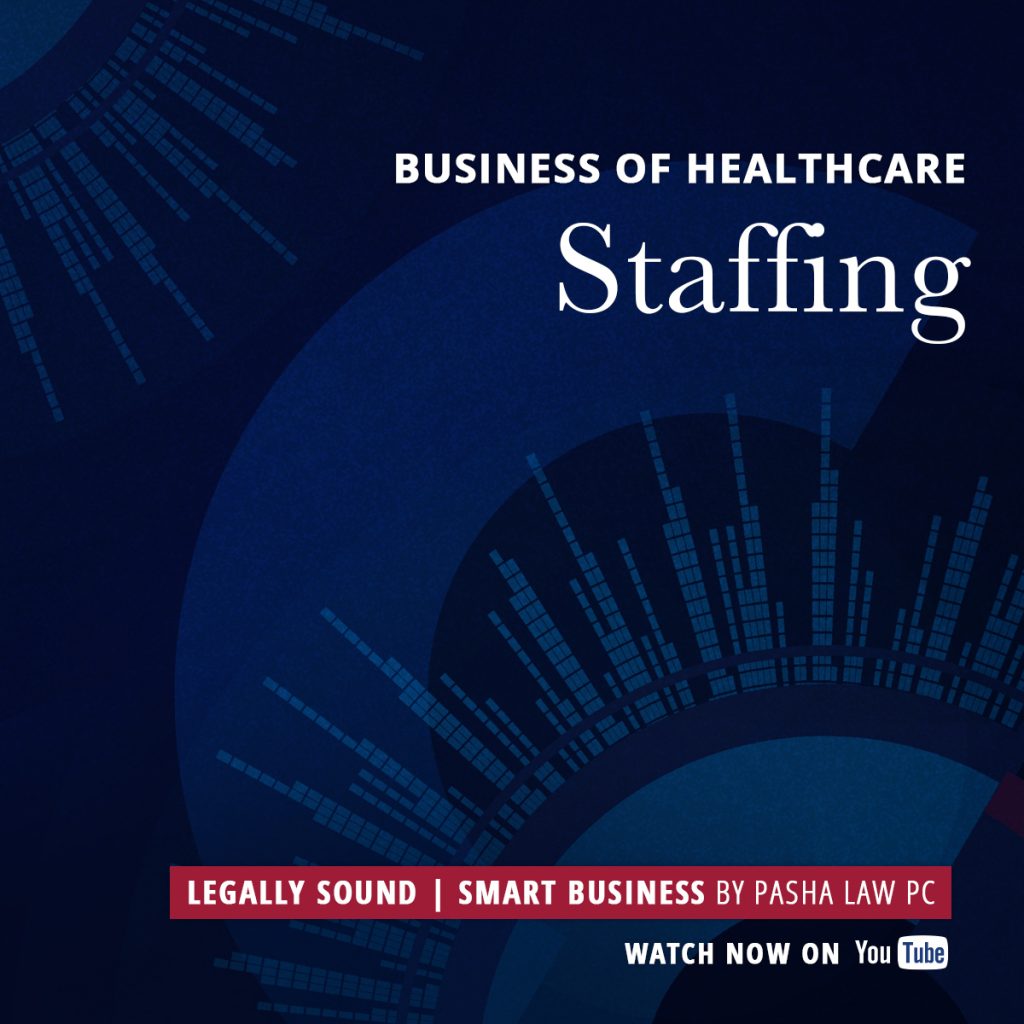
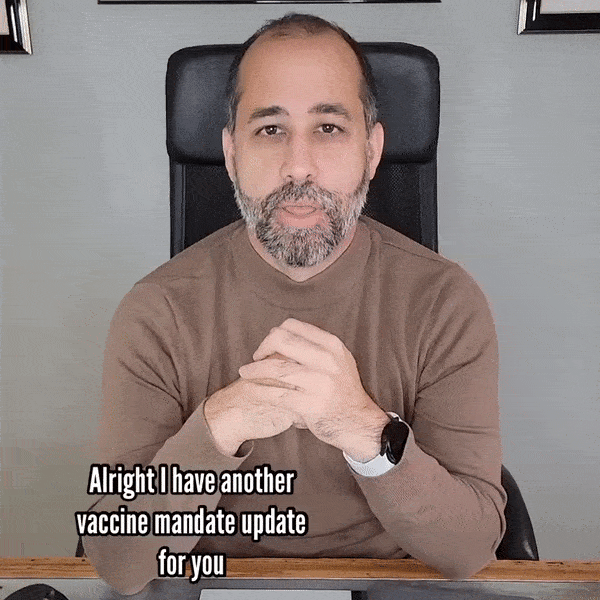
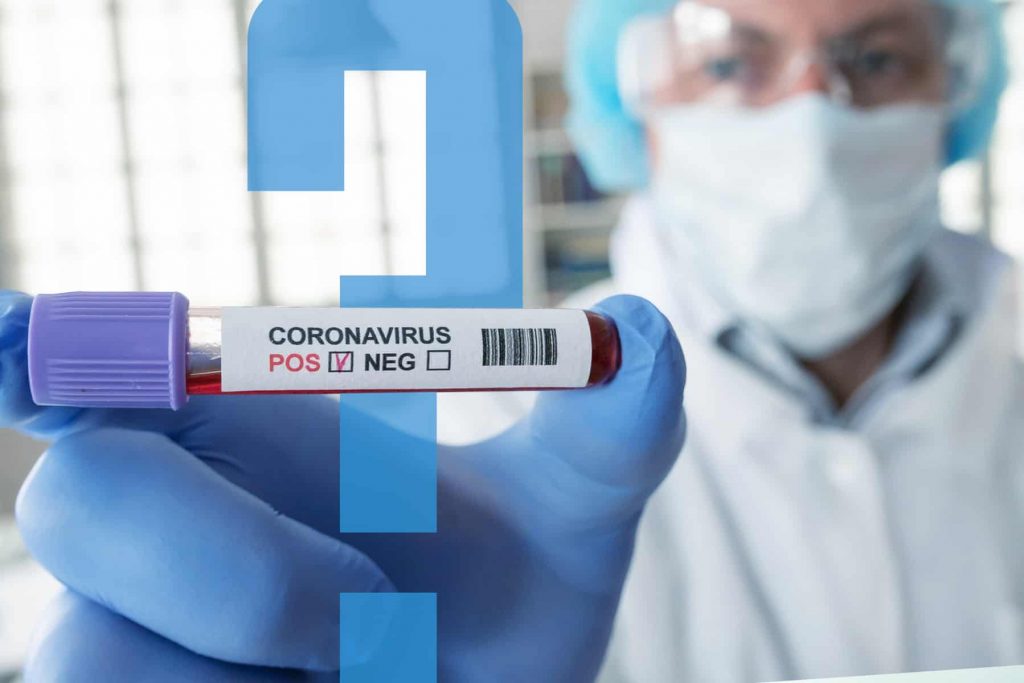




![Law in the Digital Age: Exploring the Legal Intricacies of Artificial Intelligence [e323]](https://www.pashalaw.com/wp-content/uploads/2023/11/WhatsApp-Image-2023-11-21-at-13.24.49_4a326c9e-300x212.jpg)
![Unraveling the Workforce: Navigating the Aftermath of Mass Layoffs [e322]](https://www.pashalaw.com/wp-content/uploads/2023/07/Untitled-design-23-300x212.png)
![Return to the Office vs. Remote: What Can Employers Legally Enforce? [e321]](https://www.pashalaw.com/wp-content/uploads/2023/01/Pasha_LSSB_321_banner-300x212.jpg)
![Explaining the Hans Niemann Chess Lawsuit v. Magnus Carlsen [e320]](https://www.pashalaw.com/wp-content/uploads/2022/10/LAWYER-EXPLAINS-7-300x169.png)
![California v. Texas: Which is Better for Business? [313]](https://www.pashalaw.com/wp-content/uploads/2021/07/Pasha_LSSB_CaliforniaVSTexas-300x212.jpg)
![Buyers vs. Sellers: Negotiating Mergers & Acquisitions [e319]](https://www.pashalaw.com/wp-content/uploads/2022/06/Pasha_LSSB_BuyersVsSellers_banner-300x212.jpg)
![Employers vs. Employees: When Are Employment Restrictions Fair? [e318]](https://www.pashalaw.com/wp-content/uploads/2022/05/Pasha_LSSB_EmployeesVsEmployers_banner-1-300x212.jpg)
![Vaccine Mandates Supreme Court Rulings [E317]](https://www.pashalaw.com/wp-content/uploads/2022/02/WhatsApp-Image-2022-02-11-at-4.10.32-PM-300x212.jpeg)
![Business of Healthcare [e316]](https://www.pashalaw.com/wp-content/uploads/2021/11/Pasha_LSSB_BusinessofHealthcare_banner-300x212.jpg)
![Social Media and the Law [e315]](https://www.pashalaw.com/wp-content/uploads/2021/10/WhatsApp-Image-2021-10-06-at-1.43.08-PM-300x212.jpeg)
![Defining NDA Boundaries: When does it go too far? [e314]](https://www.pashalaw.com/wp-content/uploads/2021/09/Pasha_LSSB_NDA_WordPress-2-300x212.jpg)
![More Than a Mistake: Business Blunders to Avoid [312] Top Five Business Blunders](https://www.pashalaw.com/wp-content/uploads/2021/06/Pasha_LSSB_Blunders_WP-1-300x212.jpg)
![Is There a Right Way to Fire an Employee? We Ask the Experts [311]](https://www.pashalaw.com/wp-content/uploads/2021/02/Pasha_LSSB_FireAnEmployee_Website-300x200.jpg)
![The New Frontier: Navigating Business Law During a Pandemic [310]](https://www.pashalaw.com/wp-content/uploads/2020/12/Pasha_LSSB_Epidsode308_Covid_Web-1-300x200.jpg)
![Wrap Up | Behind the Buy [8/8] [309]](https://www.pashalaw.com/wp-content/uploads/2020/11/Pasha_BehindTheBuy_Episode8-300x200.jpg)
![Is it all over? | Behind the Buy [7/8] [308]](https://www.pashalaw.com/wp-content/uploads/2020/09/iStock-1153248856-overlay-scaled-300x200.jpg)
![Fight for Your [Trademark] Rights | Behind the Buy [6/8] [307]](https://www.pashalaw.com/wp-content/uploads/2020/07/Fight-for-your-trademark-right-300x200.jpg)
![They Let It Slip | Behind the Buy [5/8] [306]](https://www.pashalaw.com/wp-content/uploads/2020/06/Behind-the-buy-they-let-it-slip-300x200.jpg)
![Mo’ Investigation Mo’ Problems | Behind the Buy [4/8] [305]](https://www.pashalaw.com/wp-content/uploads/2020/05/interrobang-1-scaled-300x200.jpg)
![Broker or Joker | Behind the Buy [3/8] [304] Behind the buy - Broker or Joker](https://www.pashalaw.com/wp-content/uploads/2020/04/Joker-or-Broker-1-300x185.jpg)
![Intentions Are Nothing Without a Signature | Behind the Buy [2/8] [303]](https://www.pashalaw.com/wp-content/uploads/2020/04/intentions-are-nothing-without-a-signature-300x185.jpg)
![From First Steps to Final Signatures | Behind the Buy [1/8] [302]](https://www.pashalaw.com/wp-content/uploads/2020/04/first-steps-to-final-signatures-300x185.jpg)
![The Dark-side of GrubHub’s (and others’) Relationship with Restaurants [e301]](https://www.pashalaw.com/wp-content/uploads/2015/04/When-Competition-Goes-Too-Far-Ice-Cream-Truck-Edition-300x201.jpg)
![Ultimate Legal Breakdown of Internet Law & the Subscription Business Model [e300]](https://www.pashalaw.com/wp-content/uploads/2019/05/Ultimate-Legal-Breakdown-of-Internet-Law-the-Subscription-Business-Model-300x196.jpg)
![Why the Business Buying Process is Like a Wedding?: A Legal Guide [e299]](https://www.pashalaw.com/wp-content/uploads/2019/03/futura-300x169.jpg)
![Will Crowdfunding and General Solicitation Change How Companies Raise Capital? [e298]](https://www.pashalaw.com/wp-content/uploads/2018/11/Will-Crowdfunding-and-General-Solicitation-Change-How-Companies-Raise-Capital-300x159.jpg)
![Pirates, Pilots, and Passwords: Flight Sim Labs Navigates Legal Issues (w/ Marc Hoag as Guest) [e297]](https://www.pashalaw.com/wp-content/uploads/2018/07/flight-sim-labs-300x159.jpg)
![Facebook, Zuckerberg, and the Data Privacy Dilemma [e296] User data, data breach photo by Pete Souza)](https://www.pashalaw.com/wp-content/uploads/2018/04/data-300x159.jpg)
![What To Do When Your Business Is Raided By ICE [e295] I.C.E Raids business](https://www.pashalaw.com/wp-content/uploads/2018/02/ice-cover-300x159.jpg)
![General Contractors & Subcontractors in California – What you need to know [e294]](https://www.pashalaw.com/wp-content/uploads/2018/01/iStock-666960952-300x200.jpg)
![Mattress Giants v. Sleepoplis: The War On Getting You To Bed [e293]](https://www.pashalaw.com/wp-content/uploads/2017/12/sleepopolis-300x159.jpg)
![The Harassment Watershed [e292]](https://www.pashalaw.com/wp-content/uploads/2017/12/me-2-300x219.jpg)
![Investing and Immigrating to the United States: The EB-5 Green Card [e291]](https://www.pashalaw.com/wp-content/uploads/2012/12/eb-5-investment-visa-program-300x159.jpg)
![Responding to a Government Requests (Inquiries, Warrants, etc.) [e290] How to respond to government requests, inquiries, warrants and investigation](https://www.pashalaw.com/wp-content/uploads/2017/10/iStock_57303576_LARGE-300x200.jpg)
![Ultimate Legal Breakdown: Employee Dress Codes [e289]](https://www.pashalaw.com/wp-content/uploads/2017/08/Ultimate-Legal-Breakdown-Template-1-300x159.jpg)
![Ultimate Legal Breakdown: Negative Online Reviews [e288]](https://www.pashalaw.com/wp-content/uploads/2017/06/Ultimate-Legal-Breakdown-Online-Reviews-1-300x159.jpg)
![Ultimate Legal Breakdown: Social Media Marketing [e287]](https://www.pashalaw.com/wp-content/uploads/2017/06/ultimate-legal-breakdown-social-media-marketing-blur-300x159.jpg)
![Ultimate Legal Breakdown: Subscription Box Businesses [e286]](https://www.pashalaw.com/wp-content/uploads/2017/03/ultimate-legal-breakdown-subscription-box-services-pasha-law-2-300x159.jpg)
![Can Companies Protect Against Foreseeable Misuse of Apps [e285]](https://www.pashalaw.com/wp-content/uploads/2017/01/iStock-505291242-300x176.jpg)
![When Using Celebrity Deaths for Brand Promotion Crosses the Line [e284]](https://www.pashalaw.com/wp-content/uploads/2017/01/celbrity-300x159.png)
![Are Employers Liable When Employees Are Accused of Racism? [e283] Racist Employee](https://www.pashalaw.com/wp-content/uploads/2016/12/Are-employers-liable-when-an-employees-are-accused-of-racism-300x159.jpg)
![How Businesses Should Handle Unpaid Bills from Clients [e282] What to do when a client won't pay.](https://www.pashalaw.com/wp-content/uploads/2016/12/How-Businesses-Should-Handle-Unpaid-Bills-to-Clients-300x159.png)
![Can Employers Implement English Only Policies Without Discriminating? [e281]](https://www.pashalaw.com/wp-content/uploads/2016/11/Can-Employers-Impliment-English-Only-Policies-Without-Discriminating-300x159.jpg)
![Why You May No Longer See Actors’ Ages on Their IMDB Page [e280]](https://www.pashalaw.com/wp-content/uploads/2016/10/IMDB-AGE2-300x159.jpg)
![Airbnb’s Discrimination Problem and How Businesses Can Relate [e279]](https://www.pashalaw.com/wp-content/uploads/2016/09/airbnb-300x159.jpg)
![What To Do When Your Amazon Account Gets Suspended [e278]](https://www.pashalaw.com/wp-content/uploads/2016/09/What-To-Do-When-Your-Amazon-Account-Gets-Suspended-1-300x200.jpg)
![How Independent Artists Reacted to Fashion Mogul Zara’s Alleged Infringement [e277]](https://www.pashalaw.com/wp-content/uploads/2016/08/How-Independent-Artists-Reacted-to-Fashion-Mogul-Zaras-Alleged-Infringement--300x159.jpg)
![Can Brave’s Ad Replacing Software Defeat Newspapers and Copyright Law? [e276]](https://www.pashalaw.com/wp-content/uploads/2016/08/Can-Braves-Ad-Replacing-Software-Defeat-Newspapers-and-Copyright-Law-300x159.jpg)
![Why The Roger Ailes Sexual Harassment Lawsuit Is Far From Normal [e275]](https://www.pashalaw.com/wp-content/uploads/2016/07/WHY-THE-ROGER-AILES-SEXUAL-HARASSMENT-LAWSUIT-IS-FAR-FROM-NORMAL-300x159.jpeg)
![How Starbucks Turned Coveted Employer to Employee Complaints [e274]](https://www.pashalaw.com/wp-content/uploads/2016/07/iStock_54169990_LARGE-300x210.jpg)
